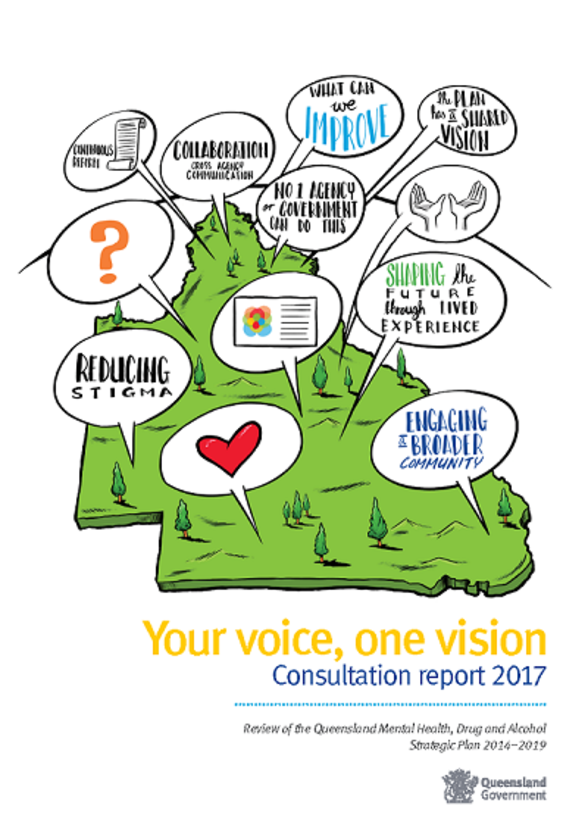The needs of Queenslanders must be front and centre in further reforms to mental health, alcohol and other drug, and suicide prevention services.
That was among the key findings of a consultation report released for Queensland Mental Health Week (8-14 October) at Parliament House today.
The Queensland Mental Health Commission will use the consultation findings in talks with decision-makers, and to guide development of a renewed Queensland Mental Health, Drug and Alcohol Strategic Plan, due in 2018.
Queensland Mental Health Commissioner Ivan Frkovic said there had been considerable reform and progress at national and state levels in the three years since the Commission’s first state-wide strategic plan was developed, but there was still more to do to meet the needs of the people using the system.
The consultation report –Your voice, one vision – sets the scene for future reform to the state’s mental health and other social services.
Mr Frkovic said a clear message has emerged from the consultation that services need to be designed around the needs of people using them, rather than the system itself.
“People should not need to be experts in the mental health, alcohol and other drug system to be able to access the support that they require.”
“The Commission heard examples of people falling through the gaps because they do not meet eligibility criteria, and as a result are being bounced around different services,” Mr Frkovic said.
“Our systems should be geared towards recovery. A recovery-oriented system is more than good clinical care.
“It is good clinical care plus appropriate family and community support, good physical care, stable housing and support to access work, education, or other meaningful activity.”
Stronger links between clinical and non-clinical supports to aid recovery was also highlighted; as was joint planning and coordination across all levels of government, private and non-government organisations.
The report identified the need for greater investment in prevention programs to promote good mental health and wellbeing to prevent mental illness, rather than a focus solely on treatment at the point of crisis.
“Good practice needs to be embedded across the system to achieve sustainable change and improve outcomes,” Mr Frkovic said.
More than 250 Queenslanders gave their views during 2017 at forums held across the State, plus a further 200 in expert reference groups and roundtables.
The Commission also received written feedback on two discussion papers.
Mr Frkovic said: “We heard from people living with a mental illness and problematic alcohol and other drug use, their families, carers and friends, as well as people who have been affected by suicide.
“We also heard from frontline service providers including health care workers, community, and other government agencies, including local government.”
As well as guiding the Commission’s renewed Strategic Plan, the consultation report provides valuable insights for other policy makers and service organisations.
“Improving mental health and wellbeing requires all of us, from across many sectors and levels of government, the private sector and the broader community, to work together,” Mr Frkovic said.
“System transformation will take time, and we will continue to work with all stakeholders to prioritise reform initiatives for a renewed strategic plan.
“Queensland Mental Health Week is the right time to be talking about our renewed plan and the importance of placing the needs of Queenslanders front and centre.”
Around half of all Queenslanders will experience some form of mental illness during their lifetime, and many more will see friends or family members affected.
For information on the “Your voice, one vision” consultation report, visit www.qmhc.qld.gov.au
-
 MEDIA RELEASE :: Mental health reforms need to focus on people (PDF, 173.36 KB)
MEDIA RELEASE :: Mental health reforms need to focus on people (PDF, 173.36 KB)

